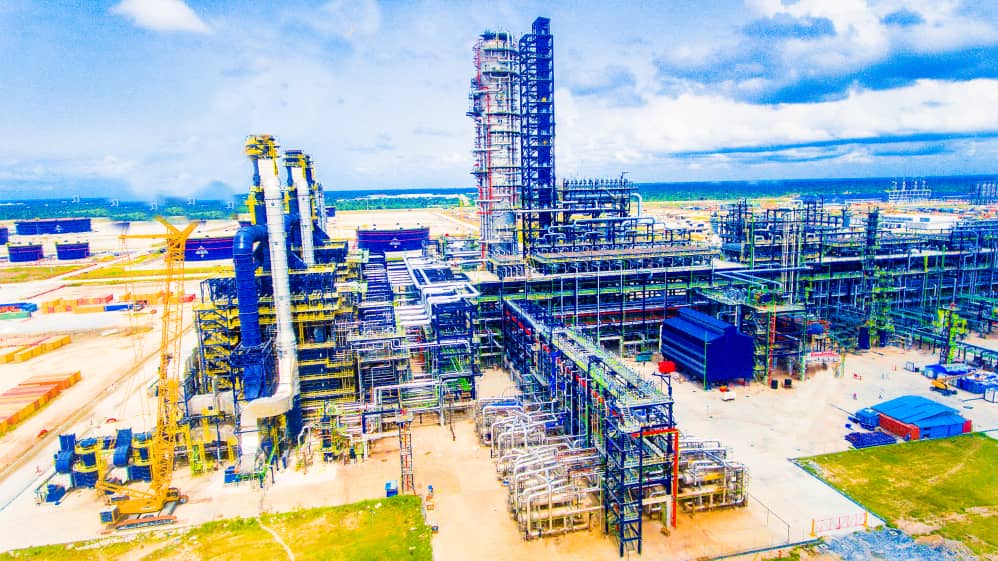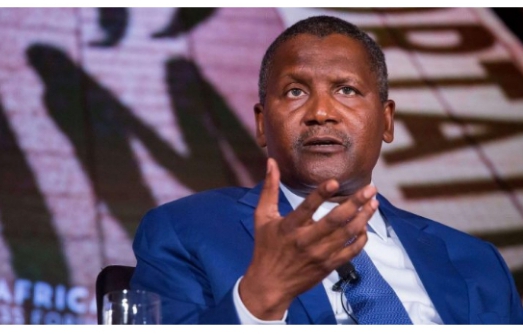FG counters Dangote on ‘dirty fuel’ allegation, says deregulation allows marketers source products from anywhere

By Emma Ogbuehi
A war of words has ensued between the Federal Government and the Dangote Refinery over the latter’s allegation that International Oil Companies (IOCs) in Nigeria were frustrating the survival of the new Dangote Oil Refinery and Petrochemicals.
Vice President of Oil and Gas at Dangote Industries Limited, Devakumar Edwin, on Friday, said the IOCs were “deliberately and willfully frustrating” the refinery’s efforts to buy local crude by hiking the cost above the market price, thereby forcing the refinery to import crude from countries as far as the United States, with its attendant high costs.
Speaking to journalists at a one-day training programme organised by the Dangote Group, Edwin also accused the Nigerian Midstream and Downstream Petroleum Regulatory Authority of granting licences indiscriminately to marketers to import dirty refined products into the country.
According to him, the Federal Government issued 25 licences for the construction of refineries in Nigeria, but only the Dangote Group delivered on its promise.
READ ALSO: Dangote alerts Nigerians of gang up by IOCs to cripple local refining of PMS, diesel, others
But in a rebuttal on Tuesday, the Nigerian Midstream and Downstream Petroleum Regulatory Authority (NMDPRA) denied the allegations that it was issuing import licenses indiscriminately to marketers despite the country’s capacity to refine diesel.
According to the NMDPRA, the deregulation of the downstream sector allows marketers to source products from anywhere, whether locally refined or imported from outside the country.
The Authority emphasized that marketers have the freedom to make commercial decisions on where to source their products, and that the NMDPRA’s role is to ensure that quality products are sold to consumers and at a fair price.
Speaking to journalists at the end of a meeting with local refiners and marketers, the Executive Director, Distribution Systems, Storage, and Retailing Infrastructure, NMDPRA, Ogbugo Ukoha, said while the government would continue to encourage patronage of the local refiners, the decision ultimately lies with the marketers.
“What we have in Nigeria is a deregulated market that remains open. The Petroleum Industry Act makes a number of provisions and the Authority will continue to work towards operationalising all those. That is the guarantee that we give, that in the fullness of time all the aspects of the PIA will be operationalised.
“Currently, the refiners locally are producing substantial volumes of AGOs (automotive gas oil) and ATK (aviation turbine kerosene), and we have assurances that shortly PMS (premium motor spirit) will also kick in. There are also intermediate products that are produced. The modular refineries have historically been doing LPFO and Nafta, those are intermediate products. But the country is working towards when its self-sufficiency will be achieved”.
On the allegations that its licence holders were importing substandard petroleum products, Ukoha dismissed the claims as false, pointing out that the sulphur content of diesel imported into the country was below the average set by regulators.
He said: “NMDPRA takes very seriously its statutory mandate to ensure that only quality petroleum products are supplied and consumed in Nigeria.
“A lot of people do not know the background that I will provide now. The ECOWAS Heads of States in 2020 endorsed a declaration adopting the Afri-five fuel roadmap that requires that certain products have as a minimum 50 parts per million litres (ppm) of sulphur.
“Whilst it encouraged almost immediate enforcement against imports to comply with that standard, the same treaty deferred enforcement for local refineries up to 31st December 2024.
“Now the PIA, when it was passed in 2021 in section 317, also captured and upheld these ECOWAS treaties. So as an Authority what have we done since we came into being? We started by engendering compliance and we saw a downward trend up to 2022 – 2023 December. In January of this year, we noticed a spike in the sulphur content of products being imported. And we again now began strong enforcement from the first of February.
“I’m happy to tell Nigerians that up until as we speak in June, the average sulphur content in every AGO that is brought into Nigeria is far below what the 50 PPM provision is in the law. With the local refineries, remember that, that declaration deferred it, and so they continue to produce at a higher level, but we’re not very anxious about that. Because even the new refineries that are coming in, have within the design of the plant desulfurization units that will see in the nearest future, that sulphur going down as low as 10 ppm.
“And so I would like to assure Nigerians that this is a mandate that the Authority takes very seriously and that we are here to guarantee the well-being and health of Nigerians, and there is no dirty fuel that we will encourage to come into Nigeria”.
Ukoha maintained that “there is no dirty fuel being brought in (into Nigeria)”.
Speaking earlier, the Group Managing Director, Rainoil Limited, Dr. Gabriel Ogbechie said the marketers were also buying products from the Dangote Refinery.
“The marketers want to very specially thank the leadership of NMDPRA for calling this meeting and one of the things, we have agreed that there will continually be a level playing field between the marketers and the refiners. And we would continue to collaborate for the best interest of the industry.
“We have options but I want to assure you that the major marketers have been patronising the local refineries and we will continue to patronise them. We also have the option of getting products from other sources. To the best of our knowledge that has not changed even though conversations around that are still ongoing”, he added.
On his part, the Group Chief Commercial Officer, Dangote Group, Rabiu Umar described the meeting as very productive and expressed the hope that the outcome would “move the industry in the right direction”.














